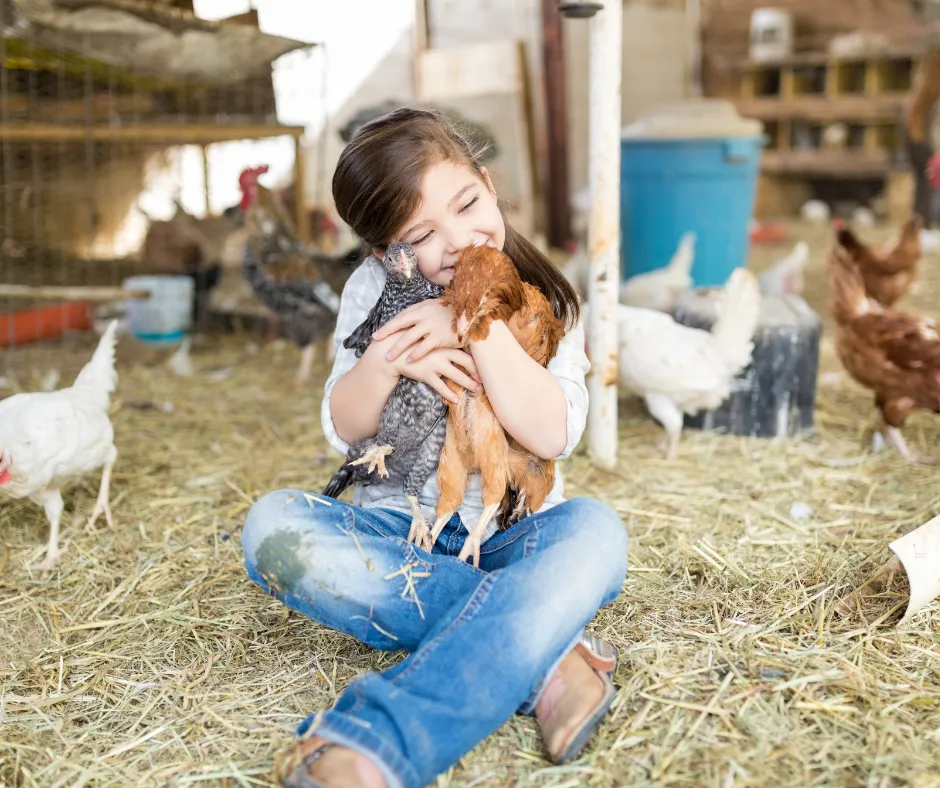
The Best Animals for Kids to Raise on a Small Farm: A Beginner's Guide for Young Farmers
🐓 The Best Animals for Kids to Raise on a Small Farm: A Beginner's Guide for Young Farmers
Introducing children to farm life is one of the most enriching experiences you can offer. Caring for animals teaches responsibility, empathy, patience, and the value of hard work. But not all farm animals are a good fit for beginners, especially for kids just starting out.
Whether you're homesteading, hobby farming, or simply want your children to experience a hands-on connection with nature, choosing the right animals can make all the difference.
In this blog post, we’ll explore:
The benefits of kids raising animals
What makes an animal “kid-friendly”
Top 7 animals ideal for young farmers
Basic care tips and safety considerations
Final thoughts on nurturing a love for farm life
🌾 Why Raising Animals Is Great for Kids
When kids are responsible for an animal’s daily needs, they learn far more than just feeding and cleaning. They build:
Confidence through routine care and handling
Compassion by understanding how to meet an animal's needs
Work ethic from early mornings and consistent chores
Problem-solving skills when faced with health or behavior issues
Plus, animals provide companionship, emotional support, and a real-life connection to food production, nature, and stewardship.
🐾 What Makes an Animal “Kid-Friendly”?
Not all animals are appropriate for small hands or beginner-level confidence. Look for animals that are:
Gentle by nature and unlikely to bite, kick, or scratch
Low-maintenance and forgiving of beginner mistakes
Manageable in size so kids can handle them safely
Interactive and engaging to build a strong bond
Temperament, daily care needs, and your child’s age and maturity all factor in.
🐣 7 Best Animals for Kids to Raise on a Small Farm
Here are our top picks for kid-friendly farm animals, with notes on why they’re great for young caretakers.
1. Chickens
Why they’re great: Small, easy to handle, and fun to watch. Plus, they can be the cluckiest friends you'll ever have!
Lessons learned: Responsibility, egg collection, and basic care.
Care needs: Secure coop, daily feeding, clean water, egg gathering.
Bonus: Different breeds have different temperaments. Buff Orpingtons and Silkies are especially docile.
2. Rabbits
Why they’re great: Gentle, quiet, and can live in hutches or colonies. Just be careful, they’re not great at playing hide and seek!
Lessons learned: Daily care, gentle handling, animal biology.
Care needs: Clean housing, pellet/hay diet, occasional grooming.
Pro tip: Start with one or two and supervise handling to avoid accidental injuries.
3. Goats (Miniature Breeds)
Why they’re great: Playful personalities and easy to bond with. Plus, they love to play king of the hill on anything they can find!
Lessons learned: Livestock behavior, feeding routines, fencing responsibility.
Care needs: Strong fencing, minerals, hoof trimming, companionship (they need a buddy!).
Nigerian Dwarfs or Pygmy goats are the best breeds for kids due to their smaller size.
4. Ducks
Why they’re great: Entertaining, friendly, and lay eggs. Who doesn’t love a waddling friend that quacks like they’re telling jokes?
Lessons learned: Water maintenance, feeding, egg production.
Care needs: A shallow water source, predator-proof pen, clean bedding.
Note: Ducks can be messy, so a proper drainage area is key.
5. Guinea Pigs
Why they’re great: Ideal for very young kids or indoor farm projects. Plus, they’re like tiny furry vacuum cleaners, always ready for snacks! 🐹
Lessons learned: Gentle handling, feeding, cleaning, attention to behavior.
Care needs: Cage cleaning, fresh hay/veggies, water, daily interaction.
Perfect for kids not quite ready for outdoor animal chores.
6. Sheep (Miniature or Hair Breeds)
Why they’re great: Calm temperament and great for showing in 4-H. They’re like fluffy clouds with legs! ☁️
Lessons learned: Grazing care, grooming, health monitoring.
Care needs: Fencing, parasite control, hoof trimming, basic grooming.
Consider Katahdin or Babydoll Southdown sheep, low-maintenance and naturally docile.
7. Cats or Barn Kittens
Why they’re great: Affectionate, helpful with rodent control, and low-maintenance. Plus, who can resist a purring ball of fur? 🐈
Lessons learned: Kindness, feeding routines, animal respect.
Care needs: Spay/neuter, access to food, clean shelter.
Cats are often overlooked in farm animal lists but they’re valuable companions and teach gentleness and observation.
✅ Tips for a Successful Start
Start small: Fewer animals means less overwhelm, and you can always expand later!
Choose the right breed: Research breeds known for calm, manageable temperaments.
Supervise early handling: Prevent accidents and teach proper care techniques.
Create a chore chart: Help kids take ownership of daily tasks. Just make sure to reward them with cookies later!
Be patient: Mistakes will happen, it’s all part of the learning process (just maybe not too many busted eggs!).
👨👩👧 Final Thoughts: Growing Hearts and Habits
Farm life offers kids a rare chance to build resilience, empathy, and confidence while bonding with animals. Choosing the right starter animals sets the stage for years of growth, on the farm and in your child’s character.
Need help choosing the right feed, fencing, hutches, or supplies? Visit Conroe Feeders Supply. Our team is here to help your young farmers start strong!
